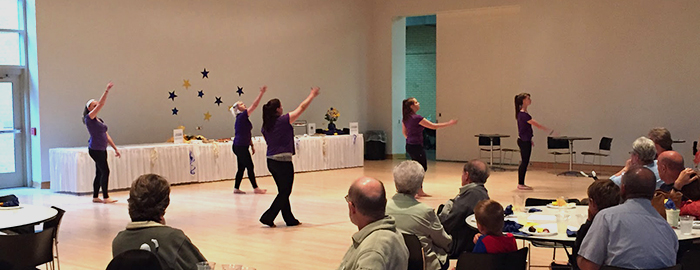
As IDEAS Academy movement teacher Molly King put it, “dance is a way to find answers and process ideas.” Five of her students used dance just in that way: to find a deeper understanding of the lives of people with Alzheimer’s and of those who care for them.
Throughout the first semester of the 2014-15 school year, Isabel Cerda, Sydney Fetterer, Cassie Grande, Caroline Judnic and Rayne O'Muineachan worked to choreograph a dance representing the changes that Alzheimer’s has on those afflicted by it and others in their lives for their IDEAS Project Block.
The IDEAS Project Block is a student-driven project that all students work on to study a topic of their choice and integrate it into an artistic medium they are passionate about.
According to O’Muineachan, they chose Alzheimer’s because “we realized we all had a connection to it. We thought it’d be an interesting topic to learn more about not only because we all connect to it, but also because it’s something we want to educate the community about.”
“I noticed a huge line of commitment and dedication to their piece,” King said. “Through their research, they were exposed to families and people connected to Alzheimer’s, and they worked really hard to stay true to these stories.”
O’Muineachan said, “I really liked working with my group to choreograph something that represents the stories we heard and create a substantial piece of art.”
In addition to sharing their work with others within the IDEAS community, the girls were given the opportunity to reach a broader audience when they were invited to share their project at the John Michael Kohler Arts Center. The arts center hosted an event called Carefree Cafe, sponsored by the Caregiver Coalition, on June 30th to give caretakers an opportunity to share their stories and provide support for one another.
“There were a lot of people who had connections to Alzheimer’s, so there were a lot of emotions coming out,” said Judnic of the event.
“It made me really proud to know that someone wanted us to show others what we had done,” O’Muineachan said.
She also said performing in front of different audiences was the part of the project that helped her grow the most. “I don’t like to talk in front of people,” she said, “but [the project] gave me more confidence. When we were presenting I felt as if everything went perfectly. I felt at home directing the conversation.”
“Everyone in the group really stepped up,” Judnic said, “especially when we see the effect it was having on our community.”

